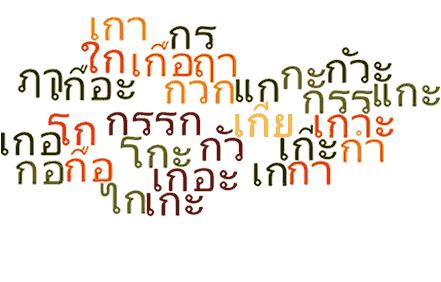Learn Thai
| English | Thai | |||
|---|---|---|---|---|
| Hello | สวัสดีค่ะ | |||
| Hello | สวัสดีครับ | |||
| Good evening | สวัสดีค่ะ | |||
| Good evening | สวัสดีครับ | |||
| Goodbye | ลาก่อนค่ะ | |||
| Goodbye | ลาก่อนครับ | |||
| See you later | เดี๋ยวพบกันครับ | |||
| See you later | เดี๋ยวพบกันค่ะ | |||
| Yes | ใช่ค่ะ | |||
| Yes | ใช่ครับ | |||
| No | ไม่ค่ะ | |||
| No | ไม่ครับ | |||
| Please! | ได้โปรดค่ะ, กรุณาด้วยค่ะ | |||
| Please! | ได้โปรดครับ, กรุณาด้วยครับ | |||
| Thanks | ขอบคุณครับ | |||
| Thanks | ขอบคุณค่ะ | |||
| Thanks a lot | ขอบคุณมากค่ะ | |||
| Thanks a lot | ขอบคุณมากครับ | |||
| Thank you for your help | ขอบคุณครับที่ช่วยเหลือ | |||
| Thank you for your help | ขอบคุณค่ะที่ช่วยเหลือ | |||
| Don't mention it | เชิญค่ะ | |||
| Don't mention it | เชิญครับ | |||
| Ok | ตกลงค่ะ | |||
| Ok | ตกลงครับ | |||
| How much is it? | ราคาเท่าไรครับ | |||
| How much is it? | ราคาเท่าไรค่ะ | |||
| Sorry! | ขอโทษครับ | |||
| Sorry! | ขอโทษค่ะ | |||
| I don't understand | ผมไม่เข้าใจครับ | |||
| I don't understand | ดิฉันไม่เข้าใจค่ะ | |||
| I get it | ผมเข้าใจแล้วครับ | |||
| I get it | ดิฉันเข้าใจแล้วค่ะ | |||
| I don't know | ดิฉันไม่ทราบค่ะ | |||
| I don't know | ผมไม่ทราบครับ | |||
| Forbidden | ห้ามค่ะ, ทำไม่ได้ค่ะ | |||
| Forbidden | ห้ามครับ, ทำไม่ได้ครับ | |||
| Excuse me, where are the toilets? | ห้องนํ้าอยู่ไหนครับ | |||
| Excuse me, where are the toilets? | ห้องน้ำอยู่ไหนคะ | |||
| Happy New Year! | สุขสันต์วันปีใหม่ค่ะ | |||
| Happy New Year! | สุขสันต์วันปีใหม่ครับ | |||
| Happy birthday! | สุขสันต์วันเกิดค่ะ | |||
| Happy birthday! | สุขสันต์วันเกิดครับ | |||
| Happy holiday! | ขอให้สนุกนะคะ | |||
| Happy holiday! | ขอให้สนุกนะครับ | |||
| Congratulations! | ยินดีด้วยนะคะ | |||
| Congratulations! | ยินดีด้วยนะครับ |
How to Learn Thai by Yourself? Start with an Easy and Free Online Course!
We have adopted an objective and efficient approach to learn how to speak a language easily and quickly. We suggest you start by memorizing words, phrases, and practical expressions that you can use in everyday life and that will be useful when traveling.
Getting used to pronouncing words out loud, such as numbers, is an easy exercise you can often practice and at any time throughout the day.
This practice will help you get accustomed to the sounds of your chosen language, making it more familiar.
Once your holidays have begun, whether in Bangkok, Pattaya, or another city in Thailand, you will be surprised at how familiar and easy to understand it will seem.
Furthermore, using a pocket dictionary is always useful, particularly during a trip. It allows you to find the translation of new words and enrich your vocabulary.
Why Speak Thai While Traveling?
An economic power filled with sumptuous temples, remarkable palaces, and magnificent beaches... Whether you are a potential investor, an adventurer, or an enthusiast of exceptional holidays, Thailand is an unmissable destination, and speaking this language will be an undeniable asset for you on many levels.
An integral member of the Asian Tigers, Thailand is a regional economic power whose economy is based on agribusiness (notably rice and prawns), the export industry, particularly in the electronic and chemical sectors, and tourism.
Make a Success of Your Stay in Thailand
Whether you are going to spend a few days with friends on a leisure trip or if you are on a business trip, nothing will be more useful than being able to slip in a few words in the language of your interlocutors. They will appreciate your effort and be more willing to help.
How to Succeed in Having Good Pronunciation Within a Week to a Month?
The official language of Thailand, Thai is written with a syllabary alphabet of 44 consonants and 15 vowel symbols that combine into at least 28 vowel forms. The language has a tonal system with 5 tones: low, mid, high, falling, and rising. Although transliterations exist, the difficulty of transcribing its script into Latin characters makes it especially important to master the Thai writing system.
While Thai writing and pronunciation may seem difficult, other aspects of the language make it easy to learn, such as the invariability of words and simple morphology. There are no articles, gender, plurals, or conjugation. All these functions are fulfilled by determinant particles.
Here Are Some Examples of Pronunciation:
- The letter หา is pronounced with a strong expiration, similar to an aspirated "h".
- The letter จา is pronounced as in "djin".
- The letters ขา, พา, and ทา are pronounced K, P, and T with strong aspiration.
- The letter วา is pronounced like the "wa" in "watt".
We invite you to listen to the pronunciation of the letters by clicking on the following link: Thai alphabet with audio.
Practical Tips for Learning Thai
1. Start with the Basics
Begin by learning the Thai alphabet and basic pronunciation rules. This foundation will help you read and speak Thai more accurately.
2. Build Your Vocabulary
Focus on everyday words and phrases that you are likely to use. Flashcards and language apps can be very helpful in expanding your vocabulary.
3. Practice Speaking
Speak Thai as much as possible. Practice with native speakers or fellow learners. Use language exchange platforms to find conversation partners.
4. Immerse Yourself
Immerse yourself in the language through Thai media. Watch Thai movies, listen to Thai music, and follow Thai news. This will help improve your listening skills and familiarize you with the cultural context.
5. Use Official Online Resources
Are there really any good resources for learning Thai apart from Loecsen?
We haven't found any. If you have any links to suggest, please let us know!
6. Take a Language Course
Consider enrolling in a language course with a qualified teacher. Personalized instruction can accelerate your learning and help you master difficult concepts.
7. Stay Consistent
Consistency is key. Practice Thai daily, even if only for a few minutes. Regular exposure and practice will lead to steady progress.
By following these steps and utilizing the available resources, you can start speaking and understanding Thai in no time. Happy learning!





